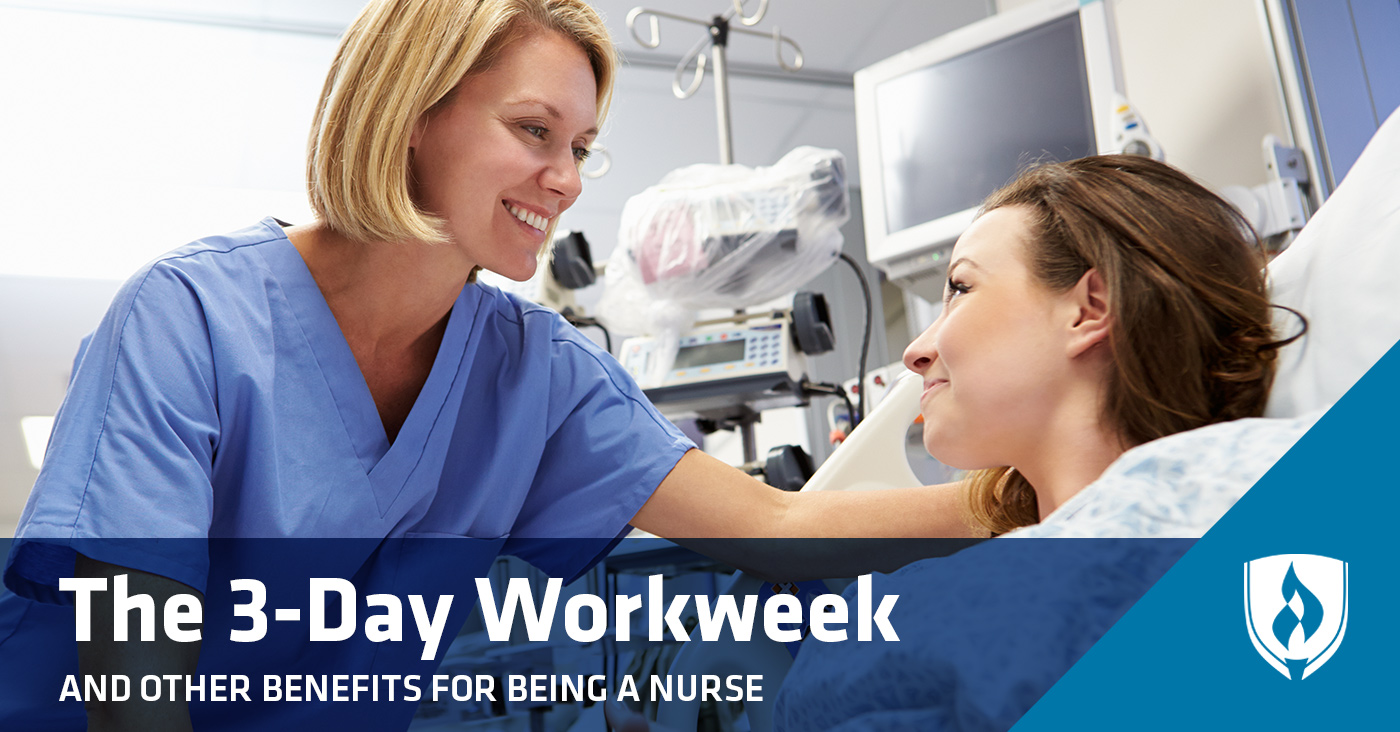
Are you looking for a rewarding career with financial, physical, mental and emotional benefits? If you have considered the field of nursing, you may not need to look any further. U.S. News and World Report recently ranked nursing in the top 25 professions of 2017, and specialties like nurse midwife, nurse anesthetist and nurse practitioner placed even higher in their ratings.
Praise like that doesn’t come from out of the blue. We’ve decided to take a closer look at what makes being a nurse so appealing to so many. If you're interested in learning more about how nurses can manage stress and maintain well-being in their profession, check out our article on "Reducing Nursing Stress".
Get Your Nursing School Questions Answered at a Nursing Information Session
8 noteworthy benefits of being a nurse
So what exactly is it that makes working in the nursing field so great? We talked to several nursing professionals about the benefits of being a nurse. Here’s what they had to say:
1. Jobs are increasing
There are many important aspects to consider as you begin to pursue higher education in a field you are interested in, and job availability is certainly one of them. Fortunately for nurses, there is no shortage of demand.
In fact, the Bureau of Labor Statistics projects employment of registered nurses to grow 16 percent by 2024, more than double the national average. Much of this demand is spurred by an aging Baby Boomer population. These employment opportunities come from both Baby Boomer nurses retiring and their generational cohorts reaching the age range where people require the most medical treatment.
2. There are continuous education opportunities
Nursing is a great profession for people who like to continually learn and evolve in their careers—and many employers help facilitate that.
Aubrey Richardson, registered nurse at NYU Langone Medical Center, says she enjoys having the opportunity to grow professionally.
“My hospital pays for my continuing education so I can go to grad school at NYU for free,” Richardson says. “We also get reimbursed to attend conferences and do our own research.”
3. It offers job flexibility
Is having a flexible job important to you and your family? Nursing is often touted for being one of the most flexible jobs around—a benefit many RNs enjoy.
Brooke Wallace, RN, says her unconventional schedule is a big plus.
“Being an ICU RN is busy and extremely challenging, but the flexibility it offers is great for myself and my family,” Wallace says.
Wallace says the biggest perk for her is the ability to work three 12-hour days per week while still having the benefits of a traditional 40 hour per week Monday through Friday job. She noted that her employer has a self-scheduling system that makes it relatively easy to swap shifts with other nurses if she needed to.
“As a mom, this kind of flexibility is fantastic!” Wallace says.
Of course, these schedules are often designed to help accommodate a population that needs nursing services 24/7, but even the potential drawbacks of "always on" demand like working on holidays can have their benefits.
4. You can stay active
While being on your feet for hours at a time isn’t always comfortable, nurses do get the benefit of exercise. It may seem like a small thing, but desk jobs can be very hard on a body. That’s not to say there aren’t unhealthy nurses—exercise is only part of the equation—but nurses do have a built in advantage of steady physical activity.
5. It provides a positive perspective on life
In a field where you are helping people in dire situations day in and day out, there are bound to be emotional benefits. Kathleen Boucher, ICU nurse at Kingston General Hospital, says she enjoys her career in nursing because it puts life and its problems in proper perspective. For instance, little things like your kids running into trouble at school don’t seem so big after spending hours with people fighting to stay alive.
Tina Baxter, APRN, GNP-BC, says it’s a privilege for nurses to witness these trying moments in their patients’ lives.
“You see a person at their worst, when they are the lowest, and then in some cases, you get to see them triumph when they get better and you know you had a role in their recovery,” Baxter says. “If there is an unfortunate outcome, it is often the nurse who sits with a patient or family member, cries with them, and provides comfort.”
6. There are opportunities for advancement and specialization
As a nurse, if you are willing to give time and resources to furthering your education, your career opportunities are vast.
Choosing to specialize is another way to grow your professional life as a nurse. Nick Angelis, RN and author, says he’s enjoyed having the opportunity to work in different nursing focus areas as he’s progressed in his career.
“Nursing allows flexibility in a wide variety of work opportunities and can be a springboard—for example, I worked in multiple specialties and hospitals before I went to anesthesia school to become a nurse anesthetist.”
7. You can work (almost) anywhere
Most people associate nurses with hospitals. And for good reason—59% of registered nurses were employed by state, local and private hospitals in 2022, according to the BLS.*
Still, there are plenty of other places where nurses can work. Some include ambulatory services, nursing and residential care facilities, government agencies and even educational services, as the BLS shows. The options here can also have a positive impact on your paycheck.
“With travel nursing or high-overtime jobs, many nurses can make as much money as they want, provided they don't mind occasional sleep deprivation,” Angelis says.
8. You can help friends and family
“Training and clinical experience often results in nurses having practical advice for those with health problems, because they have to improvise on the job but still have a scientific knowledge about physiology and sickness,” Angelis says.
Many nurses enjoy being able to help support their friends and family with their knowledge in the healthcare field. You might not always love being the go-to person for taking a closer look when a family member has an odd-looking rash, but it can feel good knowing your loved ones look to you for advice.
9. You’ll make a difference every day
Though the mental, financial and physical benefits of being a nurse are many, at the end of the day, most nurses find their job rewarding simply because they get to help people. It may seem like just another job to some, but nurses have the potential to change the course of a patient’s life on a given day.
“You get to go home at the end of the day knowing you have made a difference,” Baxter says.
Is this your calling?
If you were already considering a career in nursing, these benefits of becoming a nurse will likely support your decision. It might be time to take the next step in your research. Let us help you in our article, “What Does a Registered Nurse Do?”
RELATED ARTICLES:
- Your Step-by-Step Guide to Getting Into Nursing School
- What Makes a Good Nurse? Experts Reveal What it Takes
- Don’t Fear the TEAS Test: Expert Tips to Help You Pass on the First Try
- Scoping out Healthcare Careers: Nursing vs. Medicine
- I Hate Bedside Nursing.. Now What?
- Types of Therapy: A Look at 7 Commonly Used Mental Health Treatments
- Does CNA Experience Help? What Future Nursing Students Should Know
- What Is Orthopedic Nursing: A Look Beyond the Bare Bones
- CVICU Nursing: A Specialty for Nurses with Heart
*Data represents national, averaged earnings for the occupations listed and includes workers at all levels of education and experience. This data does not represent starting salaries and employment conditions in your area may vary.
EDITOR’S NOTE: This article was originally published in March 2014. It has since been updated to include information relevant to 2017.




